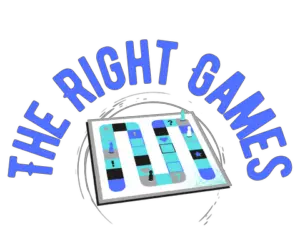Selecting the perfect game for a specific group of people can be a challenging task, but it’s essential to ensure that everyone has a great time and stays engaged. In this blog post, we’ll explore the factors that make a good game, discuss the psychology of effective game participation, and provide actionable methods for selecting the right game for your group.
What Makes a Good Party Game?
If you are serious about playing a game at your event that will be fun, new, and engaging, then we first need to cover the key attributes that make up a great party game.
Easy to Learn
Party games should have simple rules that can be quickly explained and understood by all participants, regardless of their gaming experience. Here are some things that make games easy to learn:
- Simple rules: Go for games with straightforward rules that can be explained in a few sentences. The simpler the rules, the easier it is for players to understand and start playing quickly.
- Familiar concepts: Choose games that involve familiar concepts or actions, such as guessing, drawing, or acting. This helps players grasp the game’s objective more easily.
- Minimal components: Games with fewer components, such as cards or tokens, are generally easier to set up and explain. This also reduces the chances of players getting confused about the purpose of each component.
- Quick gameplay: Games with short rounds or turns are easier to learn, as players can quickly grasp the flow of the game and understand the consequences of their actions. It also makes sure multiple people are participating often.
- Scalability: Opt for games that can accommodate various group sizes without significantly altering the rules or gameplay.
An example of an easy-to-learn game is Charades. While most people are familiar with Charades, it does have many variations but it still is a game that is easy to learn. In the game, players take turns acting out a word or phrase without speaking, while their teammates try to guess what it is. The rules are simple, and the game requires no special equipment or setup.
Now Charades is a bit of a cliché party game, if you are going to play charades at your party be sure to spice it up with a twist.
Avoid games that have several of these attributes:
- Complex: Games with numerous rules or exceptions can be challenging to explain and may discourage players from participating.
- Lengthy setup: Games that require a long setup time or involve many components can be daunting for new players and may delay the start of the game.
- Steep learning curve: Games that require players to develop specific strategies or master certain skills can be difficult for newcomers to learn quickly.
- Heavy reliance on jargon: Games that use specialized terminology or game-specific language can be confusing for new players.
An example of a harder-to-learn game is Mafia (also known as Werewolf or Village). This game involves players taking on secret roles as mafia members, townspeople, and special characters like detectives and doctors. The game has multiple phases, requires strategic thinking, and can be challenging to explain to new players due to its complexity and numerous rules.
This game is one that might be worth trying in a small group of people you are familiar with and you can spend some time getting familiar with the game together.
Fun Gameplay
Simply put a good game should be fun to play. What makes something fun is of course relative but there are some general characteristics that can help make a game more fun than others. Along with being easy to learn, a fun party game should have these attributes:
- Fast-paced: The game should have quick rounds or turns, keeping the momentum going and maintaining players’ interest.
- Humorous: A fun party game often incorporates humor, either through the game’s content or the situations it creates, leading to laughter and enjoyment. Consider your specific group or party attendees, can you incorporate inside jokes relevant to your crowd?
- Physical Movement: Not all settings will allow for much physical actions, but generally speaking a simple game can be turned into a more exciting experience with a little movement. For example: In trivia, instead of contestants raising hands to answer the question, have them jump up out of their seat in order to be called on.
Difficulty
We already discussed how a good game needs to be easy to learn, but it still should offer participants a challenge. After all, a game that is too easy will get boring quickly. So what do you do?
- Levels of Complexity: Start out simple. After each round or as the game structure allows, increase the difficulty or add an element. This gives everyone time to learn, and then ensures that they must stay mentally involved in order to continue adapting to each level.
- Handicaps: A classic way to make a game both easy to learn but challenging is to throw in a limiting factor or handicap. For example everyone knows the three legged race. Its a simple concept, a foot race, but tie two people’s legs together and it becomes a challenging, interactive, teamwork building, hilarious-free-for all! Examples: introduce your game, then tell participants they must do it blind folded, or with no hands, etc.
- Luck: Just look at slot machines. People will spend hours and tons of cash just pulling a lever and hoping they win. No skill, just luck. If you incorporate an aspect of chance into a game it is sure to make things challenging because they cannot just rely on skill.
Encourage Interaction
Games that encourage social interaction and collaboration are proven to be more successful. With certain groups this can be one of the most challenging aspects of choosing a game that will be a hit with your crowd. Office parties or events and any gathering of teenagers come to mind as particularly hard crowds to get engaged. If you want to get willing participants with positive attitudes here is what to do:
- Appeal to Your Audience: One of the keys to successful marketing. People will be more likely to participate with enthusiasm if the game you choose is something they are interested in and also relevant to their tastes, ages, and interests.
- Set the Tone: Present a fun and upbeat environment that will get people in the right mood. (Alcohol certainly doesn’t hurt, if it is appropriate for your gather.)
- Use Teams: It is easy to follow the herd than to lead. Some of the people who might be less likely to participate will feel more empowered and at ease if there is a team with them.
- Bribes: Offer prizes! Incentivizing works. Depending on the type of party or group, the prizes can be about anything even just silly trophies or awards. One of the most memorable office Christmas parties I went to was when the winner of our trivia game got to wear a ridiculous Santa hat. You would not expect it to be a big deal but people got very competitive over this hat.
Participant Focused
Consider the specific interests and personalities of your group members when selecting a game. Choose a game that aligns with their preferences and caters to their unique traits. This might take some research but you can always refer to our lists that have ideas for several different specific types of groups and settings.
Push the Envelope
Think of the funniest comedian you have ever seen. Did they offend anyone or did they keep it clean? While you never want to isolate or offend anyone, a truly entertaining game will push the envelope and get people out of their comfort zone. The key is to balance keeping things appropriate for the group, ages, setting, etc. while at the same time being unpredictable and unorthodox enough that people remain engaged.
Methods for Selecting the Right Game
Research
Start by listing out the attributes of your party goers. What is the reason for the party, who is coming, what is the age group, etc. Then research potential game options online that fit that profile. You can read reviews, and watch gameplay videos to get a sense of what each game offers and how it might fit your group’s needs.
A bit of a plug here, this is where our site can benefit you because we have done the work already! We have several lists of game ideas suited for various different types of people, settings, and events.
Evaluate
Consider the factors discussed in Part 1 when evaluating potential game options. Make a list of pros and cons for each game and compare them to determine which one best suits your group.
This does not need to be a tedious step in the process. Basically, you want to start with a large list and this process of pros and cons can help you avoid any potential problems with a specific game. For example, you might find that a certain game will require some props that will take a while to find and your party is in 3 days. Or you might not be sure how many people will show up, so you need to eliminate any game that requires a certain number of people.
Test
If possible, try out the game with a smaller group or a few members of your target group to gauge their interest and enjoyment. This can help you make a more informed decision about whether the game is a good fit.
This is an optional step if you are hosting a smaller gathering or an event with close friends. The spontaneous fun from learning on the go together is often a memorable result of when you jump into a new game with friends.
If your party is more formal, say a work event, or church function, it never hurts to do a test run. This is especially important if the game is unfamiliar to you. You should go into the party with a clear understanding of the rules and know how to keep things moving at a good pace.
Adapt
Be prepared to adapt your game choice if it’s not working for your group. Be open to feedback and willing to try new games if necessary. This is why a test run is so important if the event is for a formal occasion. It will allow you to know what needs to be adapting ahead of time and help your party run smooth.
Practical Tips for Maximizing Enjoyment and Participation:
- Set clear expectations and rules for the game to ensure everyone is on the same page
- Use a plant: a person who you explain things to ahead of time to help demonstrate to others
- Make sure to promote celebrations
- Be patient
- Print out cheat sheets, or any helpful materials ahead of time
Conclusion
Selecting the perfect game for your group requires careful consideration of various factors, including gameplay mechanics, difficulty levels, and social interaction. By understanding the nuances of effective game participation and fun, you can create an enjoyable and engaging experience for everyone involved. Use the methods and tips provided in this blog post to help you choose the right game for your group and ensure a memorable and entertaining time for all.

